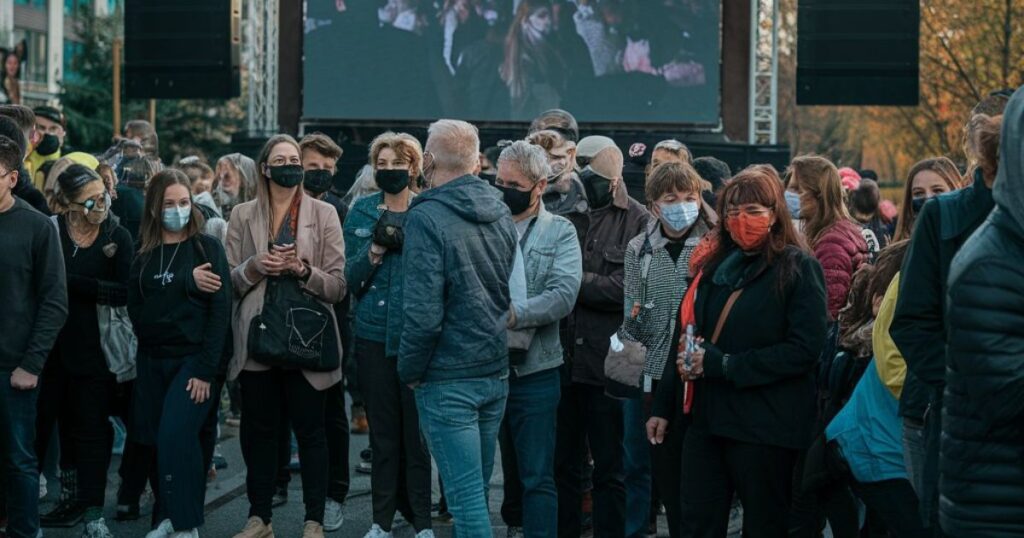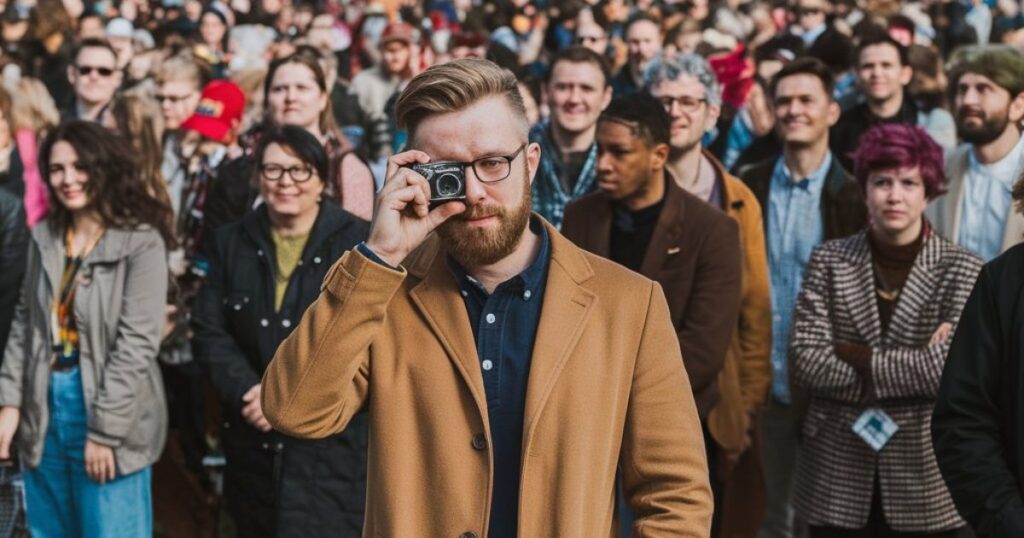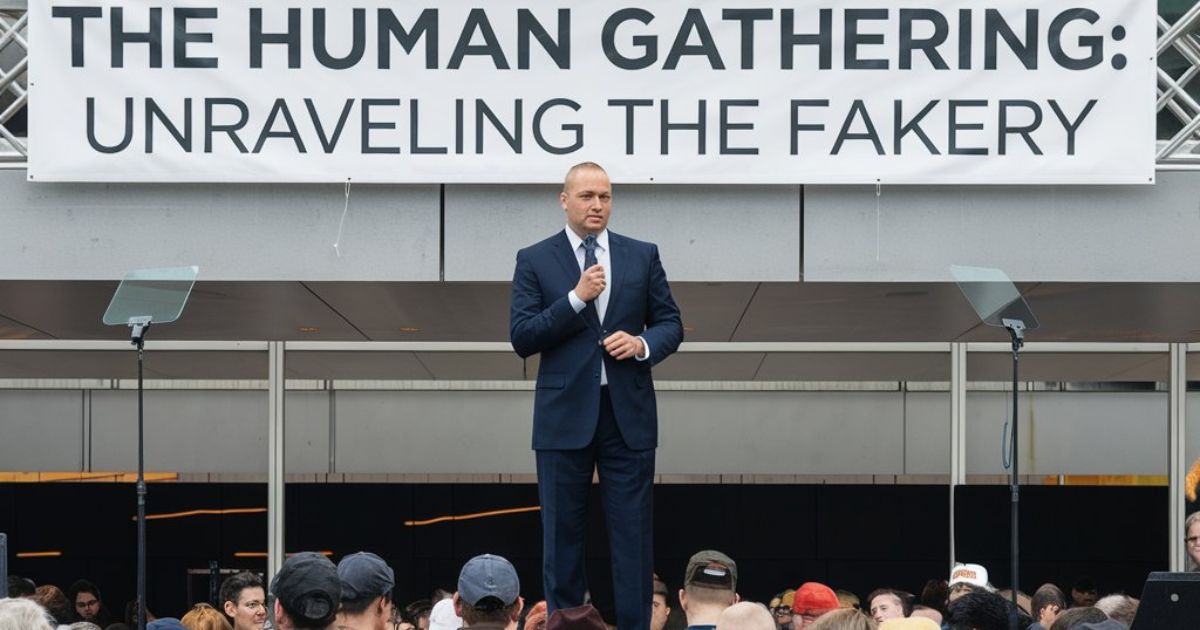In the glittering world of high-end networking events, few names have stirred up as much controversy as The Human Gathering. Billed as an exclusive congregation of thought leaders, innovators, and influencers, this enigmatic event has captured the imagination of ambitious professionals and entrepreneurs alike. But beneath the polished veneer of promised connections and life-changing experiences lurks a darker narrative—one of alleged deception and unfulfilled promises. This deep dive into The Human Gathering aims to separate fact from fiction, examining the claims of fakery that have dogged this high-profile event. The Human Gathering: Unraveling the Fakery.
The Human Gathering: An Overview

History and Mission
The Human Gathering burst onto the scene in the mid-2010s, positioning itself as the ultimate nexus for elite networking. Founded by a group of self-proclaimed visionaries, the event’s stated mission was to foster meaningful connections among society’s brightest minds. Its lofty goals included:
- Facilitating collaborations that could change the world
- Providing a platform for innovative ideas to flourish
- Creating a tight-knit community of forward-thinkers
As the event evolved, it began to attract attention from a wide array of professionals, from tech entrepreneurs to Hollywood celebrities. The promise of rubbing shoulders with the crème de la crème of various industries proved irresistible to many.
Organizational Structure
At the helm of The Human Gathering stands a core team of organizers, each boasting impressive—if sometimes unverifiable—credentials. The event operates on a membership model that emphasizes exclusivity. Here’s a breakdown of their structure:
| Level | Description | Reported Cost |
|---|---|---|
| Basic Membership | Access to main events | $5,000 – $10,000 |
| VIP Tier | Additional workshops and private meetups | $15,000 – $25,000 |
| Inner Circle | One-on-one mentorship and investment opportunities | $50,000+ |
This tiered system plays into the human desire for status and insider access, a psychological lever that The Human Gathering pulls with finesse.
Allegations and Accusations
Claims of Fraud
As The Human Gathering’s profile rose, so did the voices of dissent. Accusations of fraud began to surface, ranging from minor embellishments to outright deception. Common complaints include:
- Inflated credentials of speakers and attendees
- Promises of business opportunities that never materialized
- Misrepresentation of the event’s influence and reach
One former attendee, who wished to remain anonymous, stated, “I was told I’d be meeting CEOs of Fortune 500 companies. Instead, I found myself surrounded by other hopefuls like me, all of us sold on a dream that didn’t exist.”
Testimonials and Evidence
The internet is rife with testimonials from disgruntled participants. Many point to a stark contrast between the event’s marketing materials and the reality they encountered. Red flags identified by critics include:
- Vague descriptions of networking outcomes
- An overemphasis on the event’s exclusivity rather than concrete benefits
- A lack of verifiable success stories from past attendees
Legal Actions
While no major lawsuits have made headlines, rumors of legal rumblings persist. Several participants have reportedly sought legal counsel, exploring options for recouping their substantial investments. The lack of high-profile legal action, however, doesn’t necessarily indicate a lack of wrongdoing—it may simply reflect the challenges of proving fraud in such a subjective arena. The Human Gathering: Unraveling the Fakery.
The Broader Context: Scams in the Event Industry
The allegations against The Human Gathering don’t exist in a vacuum. They’re part of a troubling trend in the events’ industry, where the promise of exclusivity and networking often outpaces reality.
The Rise of Fake Events
In recent years, we’ve seen a proliferation of events that over-promise and under-deliver. Technology has made it easier than ever to create a veneer of legitimacy, with slick websites and social media campaigns masking a lack of substance.
Case Study: Fyre Festival
Perhaps the most infamous example of event fakery in recent memory, the Fyre Festival promised a luxury music experience on a private island. Instead, attendees arrived to find disaster relief tents and prepackaged sandwiches. The fallout included:
- Multiple lawsuits
- Prison time for organizer Billy McFarland
- A stark warning about the dangers of hype over substance
Common Characteristics of Event Scams
While not all questionable events are outright scams, many share common red flags:
- Emphasis on exclusivity over concrete benefits
- Vague promises of life-changing opportunities
- High-pressure sales tactics
- Lack of transparency about organizers and speakers
Impact on Participants
The fallout from fraudulent events extends beyond financial losses. Participants often report:
- Feelings of shame and embarrassment
- Damaged professional reputations
- Skepticism toward legitimate networking opportunities
One participant of a different high-profile networking event shared, “It’s not just the money. It’s the time invested, the hopes raised, and the letdown when you realize it was all smoke and mirrors.” The Human Gathering: Unraveling the Fakery.
Analyzing The Human Gathering

Investigation of Claims
Digging into The Human Gathering’s claims reveals a mixed picture. While some attendees report positive experiences, others paint a less rosy picture. Key findings include:
- Several advertised speakers have no record of attending the event
- Success stories lack specific, verifiable details
- The event’s claimed influence in certain industries appears overstated
Experiences of Former Participants
Interviews with past attendees reveal a spectrum of experiences:
“It wasn’t what I expected, but I did make some interesting connections,” said one tech entrepreneur.
“I felt like I was in a real-life version of ‘The Emperor’s New Clothes,'” lamented a marketing executive.
The divergence in experiences underscores the subjective nature of networking events and the challenge of definitively labeling The Human Gathering as fraudulent.
Responses from the Organizers
The Human Gathering’s organizers have not remained silent in the face of criticism. Their responses include:
- Assertions that dissatisfied attendees didn’t fully engage with the event
- Claims of successful matches and collaborations (though details remain scarce)
- Promises of increased transparency in future events
Conclusion: Is The Human Gathering Fake?
Key Takeaways
After a thorough investigation, the truth about The Human Gathering remains murky. While elements of exaggeration and misrepresentation seem evident, outright fraud is harder to prove. Key takeaways include:
- The importance of due diligence before investing in high-ticket events
- The need for clearer regulations in the networking and personal development industry
- The value of seeking out verifiable testimonials and concrete outcomes
Final Thoughts
The saga of The Human Gathering serves as a cautionary tale in an age where the line between aspiration and reality often blurs. As we navigate the landscape of professional development and networking, it’s crucial to approach opportunities with a mix of openness and skepticism.
The future of The Human Gathering and similar events will likely depend on their ability to deliver tangible value and increase transparency. For potential attendees, the lesson is clear: look beyond the glitz and glamour, and focus on concrete, verifiable benefits.
FAQs
What is the group, The Human Gathering?
The Human Gathering is a high-end networking event that claims to bring together influential leaders, thinkers, and entrepreneurs for exclusive networking and collaboration opportunities.
What are the benefits of human gathering?
When legitimate, human gatherings can provide:
- Opportunities for meaningful connections
- Exposure to new ideas and perspectives
- Potential for business collaborations and partnerships
Why is gathering important?
Gathering fulfills fundamental human needs for connection, learning, and growth. It allows for the exchange of ideas and the formation of relationships that can drive personal and professional development.
Why do we need to gather?
In an increasingly digital world, face-to-face gatherings offer unique benefits:
- Building trust through personal interactions
- Facilitating serendipitous encounters that can lead to innovation
- Providing a platform for shared experiences and collective learning











